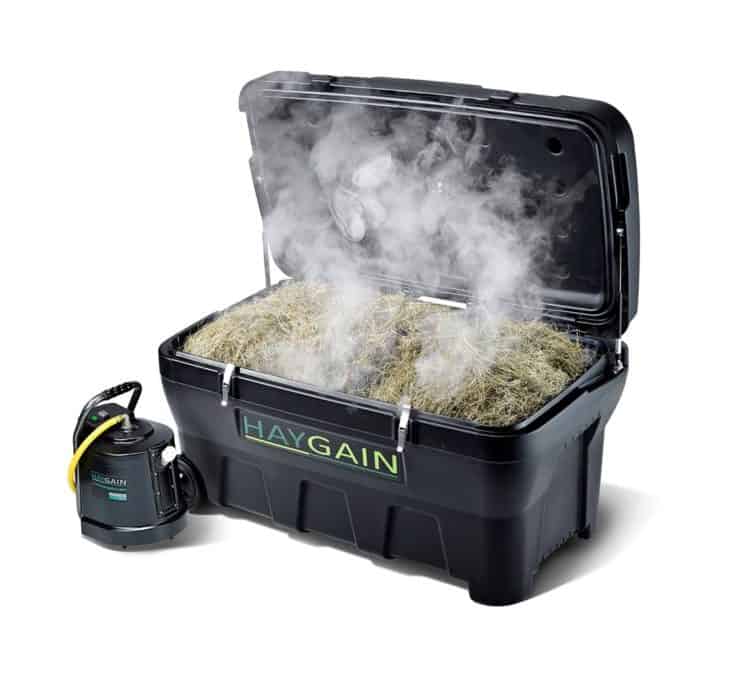Fear The Fungi
Recently published 3-year study cites steamed hay as critical to preventing IAD, a stealth equine ailment that affects over 80% of horses.
by Kim F Miller
Inflammatory Airway Disease (IAD) affects huge numbers of horses and often goes undetected while impacting their performance. A three-year research project published by The Journal of Veterinary Internal Medicine expands extensive past research confirming IAD’s prevalence. Older studies identify over 80% of the general horse population as having it. Conducted by a group of equine sports medicine veterinarians in Belgium, this new research studied over 700 active sport horses referred for performance issues or possible respiratory problems: 88% were diagnosed with IAD.
The study also cited high-temperature steamed hay as critical to preventing IAD: horses fed steamed hay were 65% less likely to develop the condition than those fed dry hay. Led by Dr. Julie Dauvillier, the study is the first to connect fungi in the horse’s respiratory system with high incidence of IAD. Along with many inhalable irritants, fungi are present in even top quality hay. High-temperature hay steaming kills fungi, hence its effectiveness in preventing IAD.
“This paper highlights a major piece of the puzzle of equine airway diseases: the role of fungi,” explains Dr. Van Erck-Westergren, co-author of the study. “In human medicine, fungi are known to cause many respiratory inflammatory conditions such as allergies, infection, asthma, etc. In equine veterinary medicine, we can find publications that relate the role of fungi in pretty nasty, potentially life-threatening diseases such as fungal pneumonia or guttural pouch mycosis, but barely anything else. Our paper shows for the first time that ubiquitous molds, including fungi, cause chronic lower airway inflammation which is deleterious for the health and performance of our horses.”
Along with dry hay, straw bedding had a high correlation to IAD incidence. Dry hay and straw bedding “cannot be recommended in performance horses,” Dr. Van Erck-Westergren states.
The study also found that soaking hay, haylage and “dust free” hay did not reduce the risk of fungi-related IAD, while wood shavings were deemed the best option for stalls that require bedding.
Fungi Found Everywhere
“Fungal spores naturally contaminate hay and straw during harvest,” the study’s authors explain. “The degree of contamination and proliferation is directly related to harvesting practices, initial levels of soil contamination, as well as storage conditions.” Of the 731 active performance horses in the study, 79% were found to have fungal elements in a cytological examination of tracheal wash fluid. Horses with fungi in their airways were twice as likely to develop IAD than those without it.
IAD is a stealth illness. It sometimes presents with an occasional cough and mild nasal discharge, but often lurks without symptoms. Unexplained decreases in performance are complaints that often lead to bronchoalveolar and trachea washes that reveal an IAD diagnosis. Unmanaged, this condition will progress and potentially mean these horses are more susceptible to debilitating extremes of the Equine Asthma Spectrum, including Recurrent Airway Obstruction, aka “heaves.”
While the study answered questions about prevalence and dangers of fungi, it raises others that warrant further investigation, especially for active sport horses. “A link between fungal growth and an immunodepressive state could not be demonstrated in our study,” the authors noted. “However, it is likely that the immune system of some of the horses included in our study would have been challenged by intensive training, regular transport and competition.”
Finding fungi in so many horses’ respiratory tracts caused the authors to question the “use of corticosteroids as a unique treatment of airway inflammation” because they depress the immune system, which actually fights the fungal infection. They noted that anti-fungal treatment is included in prescriptions for human allergic diseases involving a fungal component, like severe acute respiratory syndrome. Perhaps it should be for horses, too.
Environmental Solutions
“Environmental management is the only way to protect your horse against fungi,” explained Dr Van Erck-Westergren in a follow-up interview. “Fungi are everywhere: in the straw, in the hay and in the stall and storage areas. Their aim is to proliferate.
“There is now overwhelming evidence for the effectiveness of Haygain steamed hay in reducing IAD and helping to improve respiratory health in horses,” she continued. Regular stall disinfection, dust-free shavings and a sealed flooring system that requires minimal bedding, like ComfortStall, were additional recommendations for keeping fungi at bay, preventing Inflammatory Airway Disease and maintaining the overall respiratory health.
To read the complete study: “Fungi in Respiratory Samples of Horses with Inflammatory Airway Disease,” click Study Link.






















